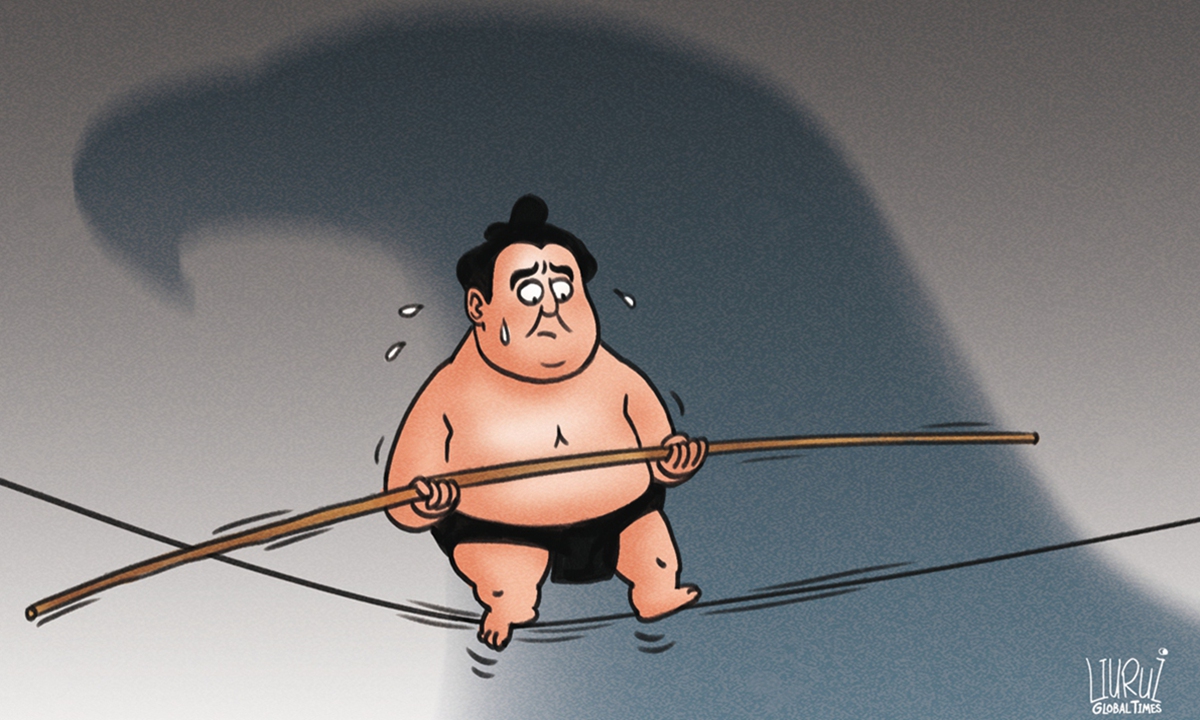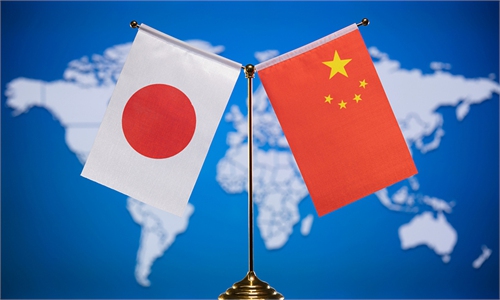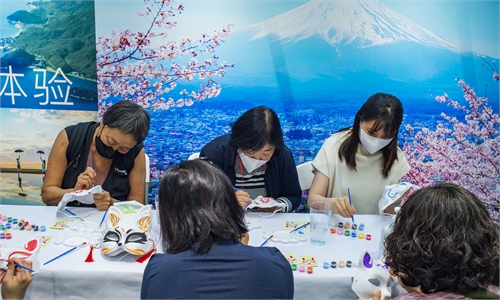
Illustration: Liu Rui/GT
September 29 marks the 50th anniversary of the normalization of diplomatic ties between China and Japan. The two sides have held a series of commemorative events recently, showing the goodwill of the friendly people from the two countries. However, the status quo of the bilateral ties, filled with difficulties, has cast some gloomy sentiment to the supposedly festive day.
Given the influence of historical sentiments, geopolitics, changes in the balance of power and other factors, the sense of mistrust and strategic doubts between China and Japan are unprecedented in 50 years. The relationship between the two countries has once again come to a critical crossroads.
Just on Monday, Japanese Prime Minister Fumio Kishida, along with visiting US Vice President Kamala Harris, pointed fingers at the Taiwan question. Chinese people do not understand: China has never owed Japan in history, yet why is Japan's hostility toward China so radical, which even surpasses that of the US? China has never regarded Japan as a "rival" or even an "enemy," but why does Japan regard China as an imaginary enemy in all respects?
Fifty years ago, the old generation politicians of China and Japan, with outstanding strategic vision and political courage, broke the ice of the Cold War, overcame various interferences and made the political decision to normalize diplomatic relations between the two countries. In the context of the Cold War between the East and the West, the realization of the normalization of diplomatic relations between China and Japan had not only created a 50-year period of strategic opportunity for peaceful development for both countries, but also greatly improved the geo-security environment in Asia and safeguarded its overall peace and long-term stability. At the same time, China and Japan, as the two engines leading the "Asian miracle," have made the "Asian Century" the expectation of the whole world.
It is regrettable to see that the important inspiration that history has left to the world has been generally ignored or misinterpreted in Japan. Therefore, taking history as a mirror is of special significance to Japan. Fifty years ago, during the Cold War when China and Japan had almost no official interactions, the two sides were able to bury the hatchet. Now, when the ties on the economy, trade, people-to-people and cultural exchanges between the two sides have long been intertwined, China and Japan should not have any hurdles that cannot be overcome. China's attitude has always been consistent. The key is that Japan should take history as a mirror, view China's development objectively and rationally, and take positive actions on this basis.
Over the past 50 years, one of the most prominent changes between China and Japan is that in 2010, China overtook Japan to become the world's second-largest economy in terms of GDP. By the end of this year, China's GDP may reach four times that of Japan. Many analysts believe this is the main reason for Japan's increasingly negative attitude toward China in recent years. Japan's domestic perception of China has not yet passed the adaptation period. During the process, some Japanese elites exaggerated the so-called China threat theory boundlessly. A few among them even had the idea of "taking preemptive move." This is undoubtedly very dangerous to Japan.
In 1924, Sun Yat-sen gave an advice to Japan in his last speech that "whether Japan will be the hawk of the Western civilization of the rule of Might, or the tower of strength of the Orient," "this is the choice which lies before the people of Japan." Japan in history once made wrong choices and experienced painful lessons. Taking history as a mirror, one can see the rise and fall of a nation. In the face of great changes in the world unseen in a century, it's time for Japan to make careful choices again.
It should be said that mutual benefit and win-win is the main theme of China-Japan cooperation, but it also faces the interference of negative factors. China and Japan have signed four political documents including the China-Japan Joint Statement and the Sino-Japanese Treaty of Peace and Friendship, which laid down the principle and political foundation of the peaceful and friendly co-existence of the two countries. However, referring to the solemn political commitments Japanese side made on historical issue and the Taiwan question, how bad are some Japanese politicians' behavior, such as visiting Yasukuni Shrine, which enshrines Japan's infamous Class-A war criminals, and interfering in the Taiwan question. In particular, Japan now has more obvious and stronger impulsive to intervene in Taiwan question, which could severely shake China-Japan relations.
It's also an objective fact that China-Japan ties are deeply restrained by the US factor. But on the other hand, Japan is not a servant that completely take orders from Washington, although the US is trying hard to shape it in that direction. Japan has always had its own calculation and room for initiative. The issue now is that Japan often applies this initiative to strengthen, rather than balance US' containment strategy against China. As a result, Japan has become a troublemaker in Northeast Asia. This will be a role that Japan will mess up.
China and Japan are hardly ordinary neighbors to each other. It's hoped that Japanese side can establish an objective and rational perception toward China, implementing the political consensus that "being each other's cooperative partners, not a threat" in actions, so as to ensure that the ship of China-Japan ties does not run aground or deviate from its course. It is not only beneficial to China and Japan, but also concerns regional and global peace and stability.


